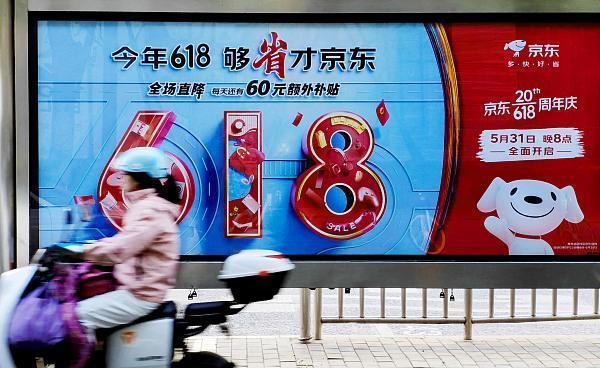China's extended '618' shopping festival unleashes consumer spending potential
 0 Comment(s)
0 Comment(s) Print
Print E-mail Xinhua, June 22, 2023
E-mail Xinhua, June 22, 2023

An advertising board in Beijing on May 23, 2023. [Photo/CFP]
On Tuesday evening, Ren Jiaxin from the city of Taiyuan, north China's Shanxi Province, opened a link of an enticing offer shared by her best friend and placed an order for a floor washing machine, priced at about 2,000 yuan (about 278.2 U.S. dollars).
"Its sales volume and consumer ratings ranked within the top 10 of similar products in the platform," said Ren, expressing her satisfaction while highlighting the favorable pricing, comparable to the discounts offered during China's mid-year shopping spree, known as the "618" shopping festival that took place on June 18.
This year, with the recovery of consumer spending, China has embraced an extended shopping fest, with various businesses launching early promotions to attract consumers through their mobile phone screens.
On May 18, short video app Kuaishou took the lead with its pre-festival sale launch, followed swiftly by e-commerce heavyweights JD.COM and Taobao.
Many platforms and businesses have extended their preferential until June 20.
Taobao and Tmall, for instance, have announced their "largest investment in history" for the "618" festival, offering 2.3 billion yuan in virtual red envelopes to generate billions of clicks to over 1 million merchants.
For consumers, discounts are of utmost importance. Yang Haibo, who works in the internet industry in Shanghai, said that in previous years, many consumers were deterred by complicated and diverse pricing strategies, but this year's promotion activities have become more transparent and efficient.
Tmall introduced a direct price reduction approach, ensuring that all products were directly discounted. JD.COM, on the other hand, provided users with a daily subsidy coupon of "over 200 minus 20" every day, equating to a 10 percent discount after the initial price drop.
"The online shopping festival has played a positive role in the recovery of consumption," said Zhou Qingjie, a professor at the School of Economics at the Beijing Technology and Business University.
"By extending the duration, reducing prices, and optimizing services, it has gained the favor of more consumers," Zhou said.
China's consumer price index, a main gauge of inflation, edged up 0.2 percent year on year in May, according to the National Bureau of Statistics.
The 2023 McKinsey China Consumer Report identified "a continuously rising middle class" and "premiumization" as trends reshaping China's consumer market this year.
The extension of the mid-year shopping spree has had the additional benefit of alleviating pressure on logistics and delivery services.
"In previous years, at the time of "Double 11", "618", and other shopping festivals, the high volume of parcels within a short period often necessitated overtime work for many delivery personnel," said Zhu Wenlong, a courier in China's leading courier enterprise SF Express, who works in the city of Taiyuan.
"However, with the spread-out duration of the current shopping festival, the daily delivery volume has remained stable at over 100 pieces recently, making the work relatively easier, and the consumers have a better shopping experience," Zhu said.






Go to Forum >>0 Comment(s)